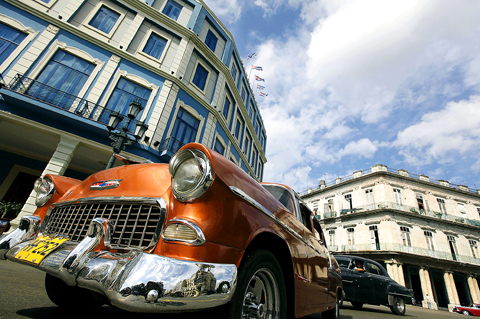Yoan used to earn US$25 a month working as a computer technician for a state company — and an extra US$500 selling Internet access on Cuba’s vast and varied black market.
The 31-year-old managed 10 accounts for government employees who had authorized e-mail access and would rent out their passwords to trusted clients under certain rules: they could only connect at night or in the early hours, and had to avoid political references.
“I did it because I couldn’t live off my salary,” Yoan said.

PHOTO: REUTERS
But the technician had taken a large risk amid a crackdown by the government of Cuban President Raul Castro as part of an offensive on illegal businesses.
“There was an audit a little while ago, they trawled through the telephone numbers and one customer gave the game away,” Yoan said. “They sacked me and I paid a 1,500 peso [US$60] fine.”
Yoan, who also received a ban from working for four years, was a tiny link in the chain connecting Cubans to the illegal network. An e-mail service costs US$10 to US$15 per month, it costs US$50 per month to navigate the Internet, and US$1 to send or receive an e-mail.
“I need to be in contact with my friends and the world, but I can’t afford ‘underground’ Internet so I only have e-mail. I connect at night because that’s what my illegal provider tells me to do,” said Aida, a 38-year-old former waitress.
Cuba connects to the Internet by satellite because the decades-long US embargo prevents access to underwater cables that pass near its coastlines.
The government blames the embargo for its limits on the service — it gives priority to state and foreign companies, academics, doctors and research centers.
Dissidents and critics of the government say Cuba, like China, limits Internet access to restrict freedom of information and control criticism of the regime.
They say that is why authorities block dissident sites or blogs, such as the award-winning blog of Yoani Sanchez, for being subversive.
Cubans can connect to e-mail at controlled state access points for US$1.5 per hour or access the Internet in hotels with cards costing US$7 per hour.
But with the average monthly salary at US$20, that is out of reach of most citizens.
“I can’t pay that — that’s why I have illegal e-mail to communicate with my father in Miami,” said Marilis, a 23-year-old law student.
“I’ve never written anything political,” she added indignantly.
Raul Castro allowed computer sales two years ago, but Internet access remains limited.
Barely 1.4 million of the 11.2 million inhabitants have Internet access, and only 630,000 have computers, according to official figures.
Shared access is blamed for slow and patchy connections.
Deputy Computing Minister Ramon Linares said recently that the island’s connection speeds had increased, and an underwater cable was due to start operating from Venezuela in 2011.
That still won’t be enough for Aida.
“Even if they solve the technical problems, we won’t have free access,” she said. “It’s clear that those who lead the country decide what we can consult.”

Incumbent Ecuadoran President Daniel Noboa on Sunday claimed a runaway victory in the nation’s presidential election, after voters endorsed the young leader’s “iron fist” approach to rampant cartel violence. With more than 90 percent of the votes counted, the National Election Council said Noboa had an unassailable 12-point lead over his leftist rival Luisa Gonzalez. Official results showed Noboa with 56 percent of the vote, against Gonzalez’s 44 percent — a far bigger winning margin than expected after a virtual tie in the first round. Speaking to jubilant supporters in his hometown of Olon, the 37-year-old president claimed a “historic victory.” “A huge hug

Two Belgian teenagers on Tuesday were charged with wildlife piracy after they were found with thousands of ants packed in test tubes in what Kenyan authorities said was part of a trend in trafficking smaller and lesser-known species. Lornoy David and Seppe Lodewijckx, two 19-year-olds who were arrested on April 5 with 5,000 ants at a guest house, appeared distraught during their appearance before a magistrate in Nairobi and were comforted in the courtroom by relatives. They told the magistrate that they were collecting the ants for fun and did not know that it was illegal. In a separate criminal case, Kenyan Dennis

A judge in Bangladesh issued an arrest warrant for the British member of parliament and former British economic secretary to the treasury Tulip Siddiq, who is a niece of former Bangladeshi prime minister Sheikh Hasina, who was ousted in August last year in a mass uprising that ended her 15-year rule. The Bangladeshi Anti-Corruption Commission has been investigating allegations against Siddiq that she and her family members, including Hasina, illegally received land in a state-owned township project near Dhaka, the capital. Senior Special Judge of Dhaka Metropolitan Zakir Hossain passed the order on Sunday, after considering charges in three separate cases filed

APPORTIONING BLAME: The US president said that there were ‘millions of people dead because of three people’ — Vladimir Putin, Joe Biden and Volodymyr Zelenskiy US President Donald Trump on Monday resumed his attempts to blame Ukrainian President Volodymyr Zelenskiy for Russia’s invasion, falsely accusing him of responsibility for “millions” of deaths. Trump — who had a blazing public row in the Oval Office with Zelenskiy six weeks ago — said the Ukranian shared the blame with Russian President Vladimir Putin, who ordered the February 2022 invasion, and then-US president Joe Biden. Trump told reporters that there were “millions of people dead because of three people.” “Let’s say Putin No. 1, but let’s say Biden, who had no idea what the hell he was doing, No. 2, and